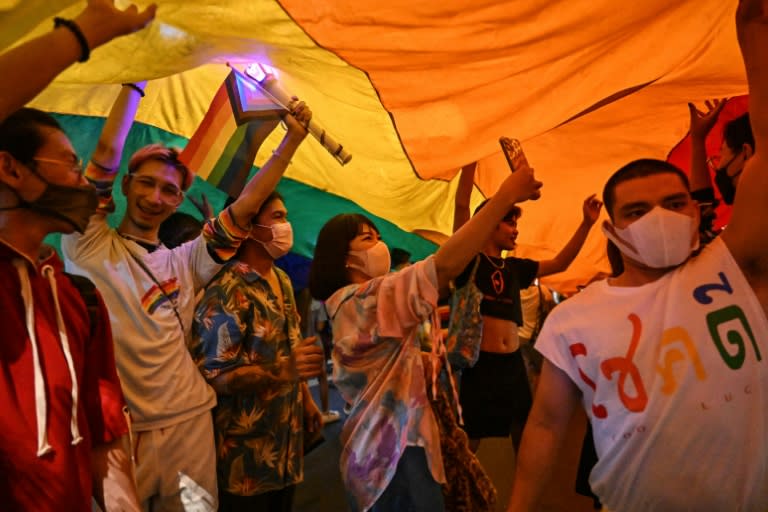Thai same-sex marriage bill passes first reading

Activists welcomed the Thai senate passing the first reading of a bill to legalise same-sex marriage Tuesday, bringing the kingdom another step closer to becoming the first Southeast Asian country to recognise marriage equality.
Thailand has long enjoyed an international reputation for tolerance of the LGBTQ community, but campaigners have struggled for decades against conservative attitudes and values.
The vote sailed through the unelected upper house -- stacked with conservative appointees named by the last junta -- with 147 votes in favour, building on the momentum from last week's landslide vote in parliament.
"It's as if we have received the greatest gift since I've been pushing for 12 years," LGBTQ gender rights activist Waaddao Chumaporn said after the senators voted.
"It has meaning not only for LGBTQ couples, but for family institutions."
On Tuesday morning the body debated the legislation, which will change references to "men", "women", "husbands" and "wives" in the marriage law to gender-neutral terms.
Activist and bill representative Chanya Rattanathada also addressed the chamber, asking senators: "Please, can I trust my future with you?"
The legislation will now go to a 27-person committee for further consideration. The senate cannot reject the proposed changes but can send the bill back to the lower house for further debate for 180 days.
It will come back for two more senate votes, with the next probably no earlier than July.
The tone in parliament was muted, with many in the LGBTQ community waiting for the legislation to become law before celebrating fully.
In a side room off from the chamber, activist Siritata Ninlapruek clutched a rainbow flag and threw her fist to the air as the bill passed its first reading.
But there was more to be done to help and protect the LGBTQ community, she told AFP.
"We still need to keep fighting for our rights."
- 'Proud of our pride' -
Senate Deputy President Singsuk Singpai said the bill passed with 147 agreeing, four against and seven abstaining in the upper house.
Last week, Prime Minister Srettha Thavisin said he was "proud of our pride" after the lower house voted to approve the bill.
"The passing (of this law) in the parliament today is a proud moment for Thai society who will walk together towards social equality and respect differences," he wrote on social media platform X.
Across Asia, only Taiwan and Nepal recognise same-sex marriage. Last year, India's highest court deferred the decision to parliament, and Hong Kong's top court stopped just short of granting full marriage rights.
LGBTQ activists celebrated last Wednesday's vote as a significant milestone on the road to equality.
Paulie Nataya Paomephan, who won Miss Trans Thailand in 2023, said until recently she had never dreamed that transgender people would be able to legally marry in Thailand.
"I think it is because politicians have to adapt themselves to the changing world," she told AFP, adding she and her boyfriend of three years planned to marry if the law passed.
The prime minister has been vocal in his support for the LGBTQ community, making the marriage equality policy a signature issue and telling reporters last year that the change would strengthen family structures.
Opinion polls reported by local media show the law has overwhelming support among Thais.
While Thailand has a reputation for tolerance, much of the Buddhist-majority country remains conservative, and LGBTQ people, while highly visible, still face barriers and discrimination.
Activists have been pushing for same-sex marriage rights for more than a decade, but in a kingdom where politics is regularly upended by coups and mass street protests, their advocacy did not get far.
Campaigner Waaddao said she knew of dozens of LGBTQ couples ready to tie the knot once the law is passed, which she hoped would happen this year.
"Once the law is enforced, yes of course, it will change Thai society," she told AFP.
"It will inspire other fights for other equalities."
tp-tak-rbu/aha

